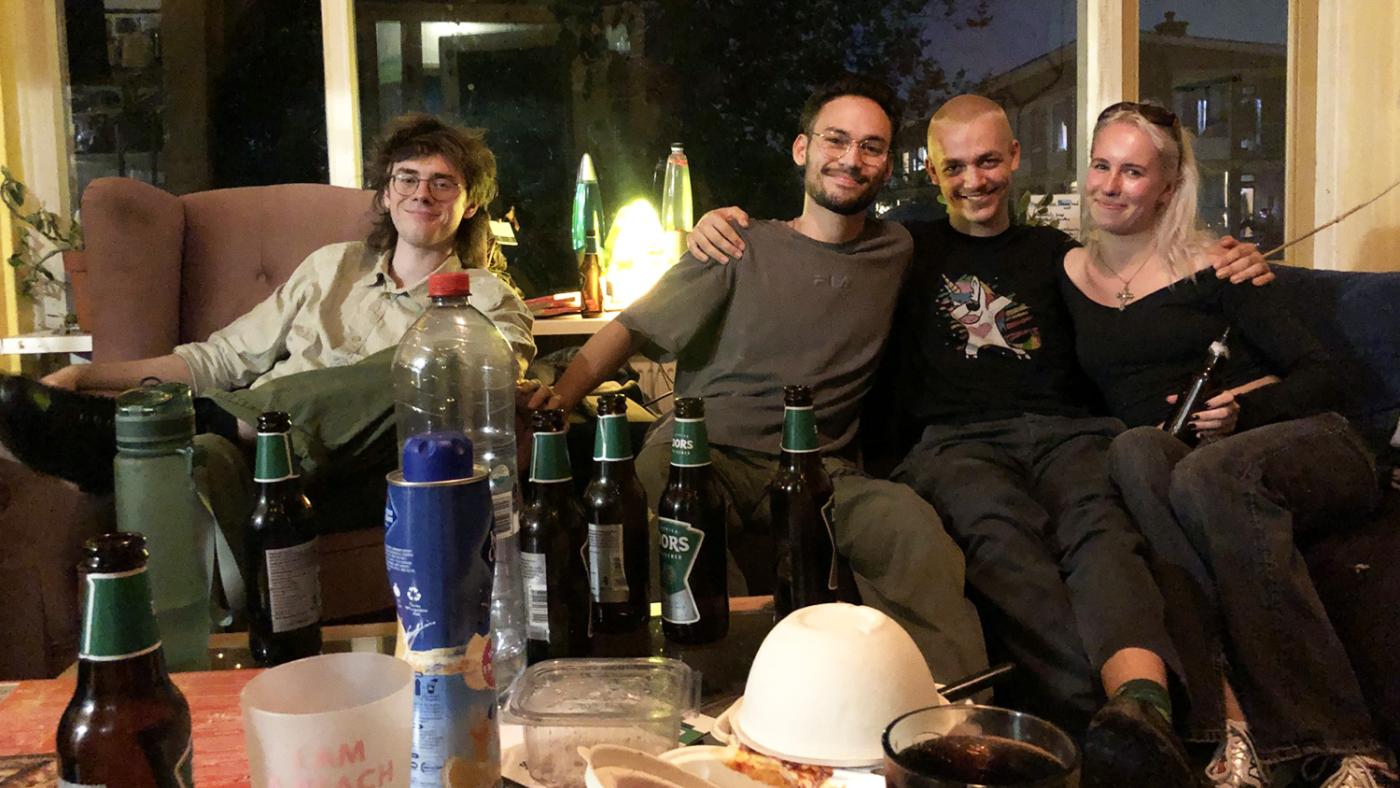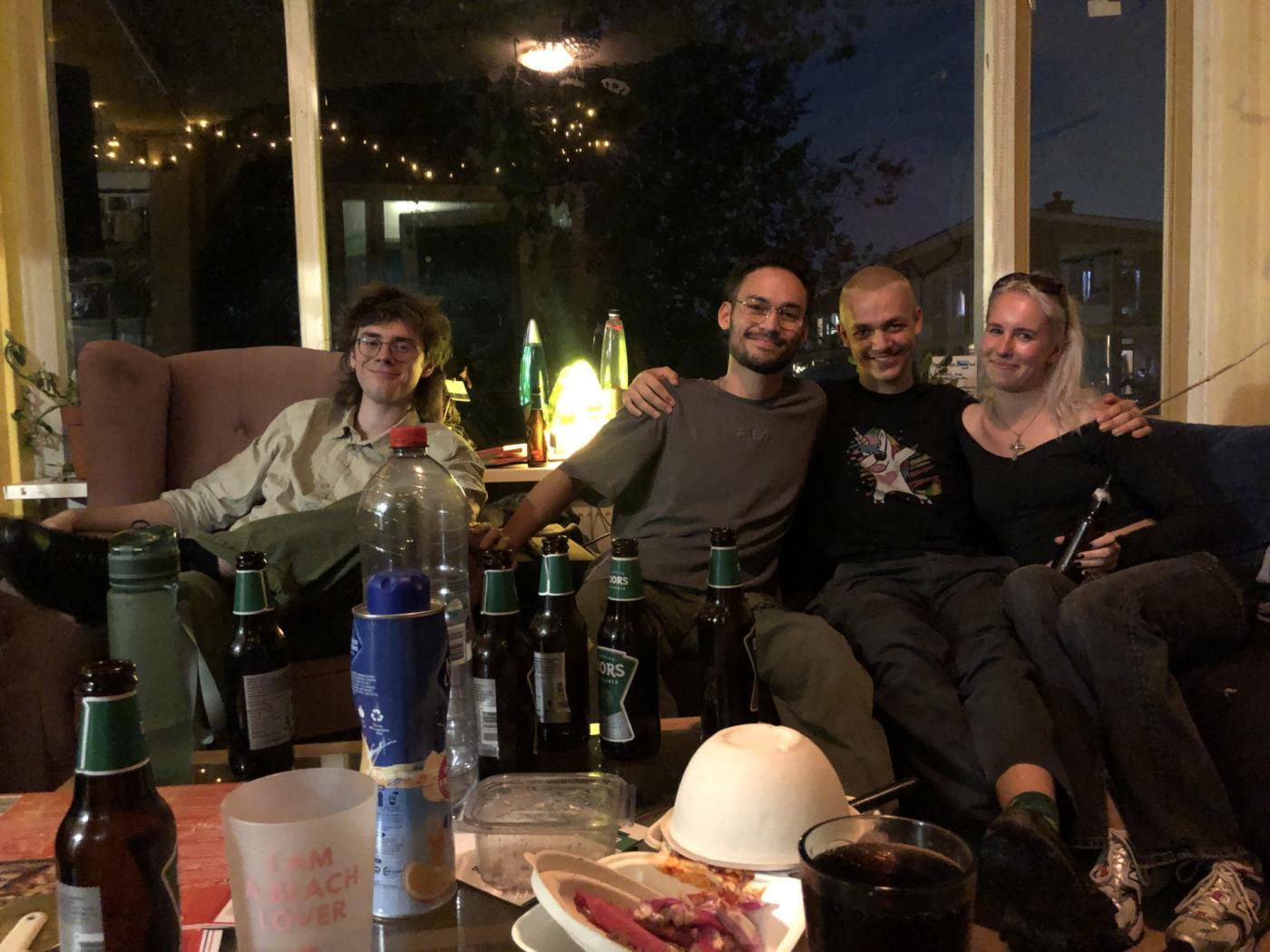Roommates in Utrecht talk about their finances
‘I’m getting the feeling that the government is against young people’

Bertus Beer House at IBB is a “family home”, according to its oldest resident, Thijs (26), a Computer Science student. Between beer crates, a hodge podge of crockery and sagging couches, the fifteen roommates share their joys and sorrows. Although the house is “alternative” and “an insanely left-wing bubble” (their own words), they’re happy living together. “We complement each other,” one of them says.
The rent, including gas, water, electricity and Internet, is about 330 euros a month. Most roommates receive a rent allowance from the government, which lowers those costs to 290 euros. A bargain in a city where the average price for a room in the private market is 837 euros.
The house belongs to the student housing provider SSH. “My previous house was terrible, this is such a relief,” says Cindy (22), a Media & Culture student. “I paid twice as much rent there and everything was mouldy and things were never repaired when they broke. Here, if something breaks, someone comes by quickly.” Morris, 21, a film student, adds: “Whether they will fix it is another story.” Cindy concludes: “At least they’re doing their best."
The financial situation differs per roommate. “I’m privileged,” says Morris. “My parents support me financially and I also get a basic grant. In addition, I don’t smoke and I don’t go out that often, so with this low rent I can manage just fine.”
Bastiaan (24), a Human Geography student, is in the middle of the pack: “I don’t get the basic grant, but I borrow money from DUO. My parents pay for my rent and tuition, and sometimes I get a little extra from them. But when I’m not working, I have to join others for dinner at the end of the month. I think it’s amazing how people do it without any help from their parents.”
Things are trickier for the others. Biology student Britt (22), who has fallen behind in her studies, is worried about the future. “My supplementary and basic grants will expire this year and my parents can’t help me out. My studies are tough and I have a lot of classes, so I can’t work much. This is going to affect me financially, even in terms of which groceries I get.”
Cindy is already further along in that process. “I didn't get the basic grant at all and my supplementary grant is now coming to an end.” Borrowing from DUO offers little solace. “After deducting tuition fees, I can only borrow up to 750 euros a month, which I do, but I've got to rely on friends and roommates for all the extras. Fortunately, I’m applying for a job tomorrow.”

Some of the students living in Huize Bertus Beer. From left to right: Morris (21), Thijs (26), Fitz (19) andBritt (22). Photo: Simon Huijben
Despite the financial differences, no one is excluded. “If someone doesn’t have money for a trip, there are always people who will lend a hand,” says Bastiaan. At the same time, "no one wants to be too indebted to the rest.”
“But most of the activities we do aren’t that expensive, like watching a movie at home or having a drink,” adds Morris. “Yes, drinking beer costs money, but it’s not that bad. It’s not like we’re members of a sailing club or anything like that.”
Interest on student loan
As of this calendar year, the interest rate on student loans is 2.56 percent, which is a cause for concern for these roommates. Cindy fears that interest rates will “be the end of many people”. Not everyone has the option of working more or spending less. "I already spend so little,” says Cindy. “I don’t buy beer and I’ve stopped buying cigarettes, so I can’t cut back much further.” Thijs says: “Being able to stop lending money is a privilege. I can’t do that, so I’ll just take that interest for granted.”
Fitz (19), who is also studying Biology, says he is “doing fine”. He gets a basic grant but observes that there is a gap between policy and reality. “The government says that the average student can manage with a part-time job and a contribution from their parents, but the average student is not synonymous with every student. If the government starts steering towards the average debt, they will screw a lot of students who are not average.” Thijs adds: “I’m from the unlucky generation, so I’ve never got a basic grant. I didn't manage to save much, even though I borrowed as much as I could and worked a few days a week. What was I supposed to do when faced with unexpected costs? The loan will go nowhere, even if you have to stop studying.”
But that's not all. Earlier this month, the government confirmed its plans to introduce a fine for students who are more than a year late to graduate from their Bachelor’s or Master’s. They will have to pay an additional 3,000 euros in tuition fees.
“That fine scares me,” Britt says. “No one finishes my study program on time.” Fitz adds: “I only know two people who could do that.” They explain that the Biology programme consists largely of electives, which cannot always be taken at the same time, so students often run into delays. “That fine is going to hinder my choice of study. I would like to take a specific course next year, but I would be late if I did, so I would have to do a fifth year of study and therefore pay that fine. So now I’m choosing another elective, one that I don't like as much.”
Britt wanted to do an internship in Mozambique next year but she is already a fourth-year student. Going there would mean getting a fine. Cindy states that many of her classmates no longer dare to do a Master’s because of the fine. “I’m in the cultural sector – not exactly known for its job prospects, so repaying the loan alone is going to be difficult.”
The government argues that students need an incentive to complete their studies quickly. “I hear this a lot,” says Thijs, “especially from people who have taken eight years to complete their studies. But nowadays you are also expected to work on your CV in addition to your studies. Such a fine only increases the pressure on students.”
Bastiaan would like to see students be allowed to take an extra year to complete their studies without a penalty. “Then there would be room to look at how you want to develop yourself. There is no more room for that now.”
Paradoxically, the crowded housing market is leading some students to study longer. “It is much cheaper to live in an SSH building than renting something on the private market, but you must be enrolled in a university to qualify for SSH. The tuition fees do not outweigh the low rent,” says Thijs. He is looking for rentals in the private sector because he is slowly outgrowing the house, but finds it “insanely depressing”. “1,500 euros rent for 30 square meters... That’s ridiculous, isn’t it?” So, he’ll probably stay here for a while. “You’re going to be the bitter, grumpy roommate,” Fitz jokes.
The government wants to cut one billion euros from the higher education budget, of which 35 million euros will be paid by Utrecht University. The cabinet would also like to limit the influx of international students. Cindy finds the budget cuts annoying “but fewer international students also means less pressure on housing”. Fitz thinks otherwise: “They want you to think that, but international students are only a small part of the problem.”
As far as Thijs is concerned, the cuts are “outrageous”. He is "getting the feeling that the government is against young people, considering the additional taxes on the cultural sector and the cutbacks in public transport.”
The students think that the cutbacks will also have an impact on the quality of education. “If there are even fewer contact hours for writing a thesis, for example, it will be very tough,” says Cindy. However, this is not a problem for everyone. “In Biology, we easily have 30 contact hours a week. It wouldn't be that bad if that was eased a little,” says Fitz.
The fact that the government has promised to "restore" the quality of education over the next few years doesn’t impress them. Britt: “They also said we could borrow interest-free and that didn’t happen either.”